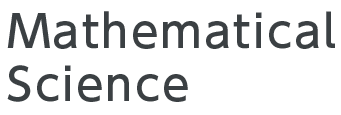For those who are interested in study methods
We can advise high school students who are applying for the Department of Information Science about how to study at high school, regardless of whether or not they are interested in mathematical models of phenomena.
For high school students who desire to attend university, your high school studies (including preparation for university entrance examinations) will help to create a foundation for your studies at university. Therefore, we advise high school students to have a clear image of what the university studies they will eventually experience will actually be. As a useful reference for high school students, we will describe some of the typical situations students face when studying at university below. For the purpose of clarity, students up to and including high school students are referred to as “high school students” while those who are university students or older are referred to as “college students.”
What are classes actually like in high school? In many high school classes, teachers may wait until their students copy down what they have written on the blackboard before providing an explanation.
However, in university courses, including video courses, lecturers write on the blackboard as they provide an explanation. Which means that college students must do two tasks at the same time: write down the words on the blackboard (visual information) and listen to what the lecturer is saying (audible information). College students can increase the efficiency of their studies, including when studying for exams, by “highlighting the important points indicated by the teacher” and by “marking any points they did not understand well (for their own review).” At the very least, during lectures, college students are thus required to perform the four tasks mentioned above. Many college students use a camera and voice recorder so that they can avoid having to write (part of multitasking). But this approach eventually requires additional time for reviewing and listening to the lectures again later on.
So, if you practice multitasking skills before you start university, you may save a lot of effort when studying at university.
Suppose that you highlighted a point you did not understand during a lecture. And you recognize that the secret to efficient studying is to solve the concepts you do not understand as soon as possible. What would you do?
One convenient approach taken by many of today’s college students in this case is to search the Internet for websites that are easy to understand, and read them. This method may in fact be useful for finding the meaning of a simple term, for example. But “what you can understand on the Internet is likely something you already know” and “what you do not understand at all will likely remain unclear even after reading relevant articles on the Internet.”
At university and beyond, you may come across new concepts every day that you do not understand. And you may not find all the answers if an “Internet search” is your only option.
For example, if you are working on something related to your thesis at university, you are unlikely to find relevant, easy-to-understand articles through Internet searches.
So, is there another way to investigate what you do not know? Yes, there is. Go to the library and look it up in books.
One typical way in which college students in all ages and countries study is to first find 10 books (for example) that can be considered relevant for the theme, place them on the desk, and use their table of contents and index to find explanations about the concepts that they do not understand, and to finally compare the explanations from these 10 books.
In order to compare the different descriptions in these books, however, you must have reading comprehension skills.
You must be able to recognize whether a sentence is a definition or a claim, and if it is a definition, you should be able to give examples, or if it is a claim, you should be able to extract the assumptions and/or conclusions.
Therefore, before entering university, you should practice skills that will facilitate your ability to read longer sentences containing concepts that you do not understand (that is, the ability to read modern texts) and skills for using (multiple) books so that you can greatly reduce the burden of studying at university.
If you use two or more reference books, you may not be able to study efficiently as each book may provide a completely different solution to a similar problem. Which is why some high school students may think that it is efficient to memorize one correct solution to one problem, and practice its application through exercises. If passing the university entrance exam is your only goal, this may be true. From the perspective of whether or not these study methods will be useful after entering university, however, this may not be the case.
For example, college students in their third and fourth years participate in seminar courses.
In these seminars, college students are required to make presentations on the assigned texts to the other seminar members, yet someone in the audience will often tell the presenter that they do not understand the explanation very well. In this case, the presenter must converse with the audience and vary how they explain the subject so that the entire audience can understand. College students must often repeat their explanations in different styles, including using calculations and graphical presentations.
This skill of changing the way in which you explain something according to the given environment, similar to the “alternative solution skills” that are required in high school, is difficult to acquire through the study practice of memorizing only one correct solution to a problem.
So, if you can get into the habit of “thinking about different solutions” before you enter university (and even better if you are able to think about the advantages and disadvantages of each solution), you may greatly reduce the burden of your studies in your third and fourth years of university.
Thus far we have discussed several points that many high school students tend to misunderstand when considering efficient approaches to studying from the perspective of studying at university.
You should keep in mind, however, that the purpose of studying in high school is not just about passing university entrance examinations, and should always remember that studying covers a broad range that includes learning new things after entering university, and even after starting work. And you should note that “a seemingly novel and efficient method of study may not actually be very useful at university (and in society)” when engaging in your studies.






